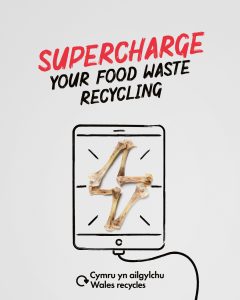Combat ‘ych-a-fi’ to unleash the power of your food waste recycling
Combat ‘ych-a-fi’ to unleash the power of your food waste recycling
Wales may be a small country, but when it comes to recycling, we punch way above our weight. With 95% of us regularly recycling our waste, we’re already the third best recycling nation in the world, and now we’ve teamed up with Wales Recycles to support their Mighty Mission to Wales get to number one.
That’s why, we’re calling on our tenants and wider Cynon Taf communities to ramp up their efforts when it comes to food waste recycling.
Whilst almost all Welsh citizens recycle everyday items such as cardboard, bathroom toiletries, and plastic bottles, many are still not recycling all their food waste. In fact, around a quarter of what’s in the general rubbish bin is still food, all of which could be recycled.
Food waste is powerful – most food waste that’s recycled in Wales is sent to an anaerobic digestion facility, where it’s turned into green energy. Last year Welsh residents recycled enough to power more than 10,000 homes, but with around 100,000 tonnes of food waste still ending up in the general rubbish bin – enough to power an additional 7,500 homes – this climate change-fighting renewable energy is lost forever.
WRAP Cymru’s research revealed the ‘yuck factor’ (or ‘ych-a-fi factor’ in Wales) is the biggest barrier, with people being put off by potential smells, leaks and spills. However, what many people don’t realise is that recycling our food waste creates fewer smells and is more hygienic than putting it in the bin. The content of our food waste caddies is collected every week, whilst our non-recyclable waste is collected less frequently.
We all produce some amount of unavoidable food waste – such as eggshells, bones, teabags and peelings – which should be recycled (if not composted at home) to generate green energy to help power communities in Wales.
Follow Wales Recycles’ 5 handy tips:
1. Use a caddy liner – Lining your kitchen caddy will keep your food waste contained, helping to reduce smells and spills, and preventing it from getting mucky. Apply liners to a clean, dry caddy, and ensure you don’t overfill them to avoid splitting.
2. Avoid liquid items – Keep liquids such as milk, juice, or cooking oil out of your caddy to prevent ‘bin juice’ from collecting at the bottom. You may pour small amounts of these items down the sink, ideally alongside a small amount of water to ensure the waste runs away easily, without causing blockages.
3. Empty your food waste caddy regularly – Empty the contents of your kitchen caddy into your outdoor food waste bin regularly, before it gets too full, to prevent smells and odours. Remember to tie caddy liners tightly before moving them from your caddy to your bin. Should your caddy start to smell, then it’s time to empty its contents into your outdoor food waste bin and start afresh with a new liner.
4. Keep a lid on it – It may seem obvious but closing the lid of your kitchen caddy will stop flies getting in, and odours getting out. Don’t forget to also close the lockable lid on your outdoor bin securely, to prevent pests and safeguard against windy weather.
5. Keep your caddy clean – Clean your kitchen caddy every few weeks. Give it a rinse in the sink. For a more thorough clean, disinfect your caddy with leftover hot water from your kettle and some washing up liquid.
If you’ve got a leftover lemon that will otherwise be uneaten, you could run its flesh against the inside of your bin. It’s a natural odour remover and will help to kill any germs that might be lurking.
To find out more tips and hacks and discover how your food waste creates power visit Wales Recycles and join the conversation on social media using the hashtag #BeMightyRecycle.

Asset Management Strategy - Survey Feedback
What do tenants think of their home?
We recently invited all tenants to complete an online survey about their satisfaction with the condition of their property. 407 residents responded, providing their views.
Thank you to all who contributed, your opinions are being included in the development of an asset management strategy. We’ll use this strategy to plan how to maintain our properties in the future.
We know maintenance of your homes is important to all our tenants, and we wanted to let you know the results of the survey.
Overall satisfaction
There was a high level of satisfaction with our homes and neighbourhoods generally. But tenants were less likely to be satisfied with the ‘quality of their home’. Levels of dissatisfaction were low for all questions.

Rating of Aspects of Properties
We wanted to understand what aspects of tenants’ homes they were particularly happy or unhappy with.
Tenants were most likely to rate the following highly:
- Shared internal spaces (for example, corridors and hallways in blocks of flats)
- Electrics
- Heating
- Communal gardens
Tenants’ main concerns were:
- Windows
- Front/back doors
- Condensation
- Private gardens

Tenants were most likely to have concerns about windows and doors because they thought they were old and were worried about draughts and cost of heating the property as a result.
Gardens were often a concern due to the layout of the garden and the fact that many are built into a slope. Privacy was also mentioned, with residents preferring to have higher walls or fencing than they currently have in place.
What would you improve?
We asked tenants to choose one thing they wanted to improve in their home. One fifth (21%) wanted to replace the kitchen. The main reasons given were the age and condition of the kitchen.

Moving home
One in six tenants said they were considering moving home, the majority of these would like to move in the next 12 months. We asked why these tenants wanted to move, and this was usually because they needed a bigger property (41%), wanted to be near family (30%), or because they didn’t like the area (25%).

Thank you!
We’re pleased to see so many tenants are happy with their homes, but we recognise there are some things residents would like improved. The data you’ve provided us in this survey is helping us develop a strategy for improvement works across our housing stock.
We will be speaking to some tenants who completed the survey in more detail about what they’ve said, so we can understand their experiences better. If you receive a call, please help us by answering our questions. If it’s not convenient, we can call you back.


